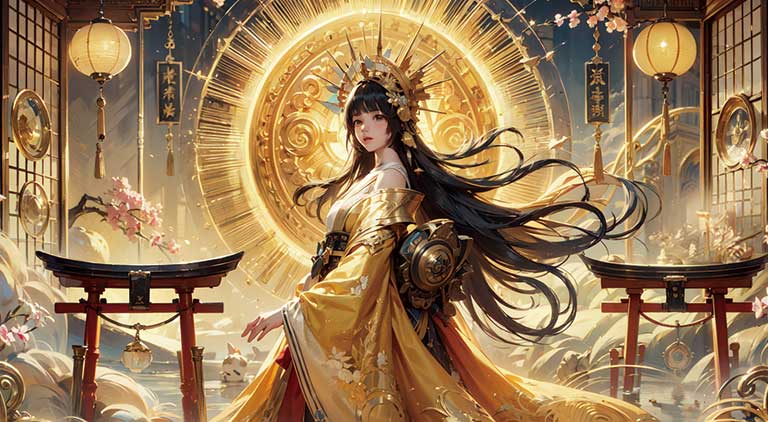Amaterasu, also known as Amaterasu Ōmikami, is one of the most important deities in Japanese mythology and the central figure of Shinto belief. Revered as the sun goddess, she symbolizes light, life, and purity. Her story is not only a cornerstone of ancient myth but also plays a significant role in Japan’s historical and cultural identity, including legitimizing the imperial lineage.
Mythological Significance
The Radiant Sun Goddess
- Symbol of Life and Order:
Amaterasu embodies the life-giving force of the sun. In ancient Japan, the sun’s warmth and light were essential for agriculture, making her a symbol of growth, prosperity, and divine order. - Central Myths and Legends:
Key episodes, such as her retreat into the cave—commonly known as the “Amano-Iwato” legend—illustrate the struggle between light and darkness. This myth encapsulates themes of renewal, hope, and the triumph of order over chaos.
The Amano-Iwato Legend
The famous Amano-Iwato episode tells of a time when Amaterasu, in response to her brother Susanoo’s disruptive actions, secluded herself in a cave, plunging the world into darkness. Through a clever scheme involving the goddess Ame-no-Uzume’s exuberant dance and contagious laughter, the other gods managed to lure her out, restoring sunlight and balance to the cosmos. This story is emblematic of the eternal interplay between light and darkness, a theme that resonates across various cultures.
Historical and Cultural Impact
Legitimization of the Imperial Family
Amaterasu is not only a mythological figure but also a symbol of divine authority. According to tradition, the Japanese imperial family is descended from her, which has historically served to legitimize the ruler’s authority. Her influence is deeply woven into the fabric of Japanese state rituals and national identity.
Shinto and Cultural Heritage
Within the Shinto faith, Amaterasu holds a position of utmost importance. Numerous shrines across Japan, most notably the Ise Grand Shrine, are dedicated to her worship. These sacred sites continue to be centers of cultural and religious activities, preserving traditions that date back centuries.
Comparative Mythology
Global Sun Deities
Amaterasu’s story shares similarities with other sun deities found around the world. For example:
- Helios and Apollo (Greek Mythology): Like Amaterasu, these gods are associated with the sun, illuminating the world and symbolizing order.
- Ra (Egyptian Mythology): Ra is another powerful sun deity whose narrative underscores creation and the sustenance of life.
Such comparisons not only highlight the universality of the sun as a symbol but also provide a richer context for understanding Amaterasu’s unique place in world mythology.
Modern Representations and Cultural Influence
In Art, Literature, and Media
Today, Amaterasu’s myth continues to inspire modern culture. She appears in various forms of media, including:
- Anime and Manga: Her image and myths are reinterpreted in popular series, bringing ancient tales to new generations.
- Video Games: Many games incorporate her legends, emphasizing themes of light versus darkness.
- Art and Literature: Contemporary artists and authors draw on her symbolism to explore themes of rebirth, resilience, and harmony.
Festivals and Rituals
In modern Japan, festivals celebrating Amaterasu remain a vibrant part of cultural life. These events not only honor her legacy but also strengthen community bonds and perpetuate ancient traditions, making her worship an enduring aspect of Japanese society.
Conclusion
Amaterasu stands as a central figure in Japanese mythology and Shinto belief. Her role as the sun goddess transcends mere myth, influencing Japan’s history, cultural identity, and modern artistic expressions. Whether you are a scholar of comparative mythology or a curious reader fascinated by ancient legends, Amaterasu’s story offers a profound insight into the interplay between nature, divinity, and human society.
By understanding Amaterasu’s myth, historical significance, and continuing cultural impact, we gain a deeper appreciation of the timeless narratives that shape human civilization.
- Amaterasu – Amano-Iwato Legend: A Mythological Tale of Light and Darkness
- source: Wikipedia – 天照大神


Comments